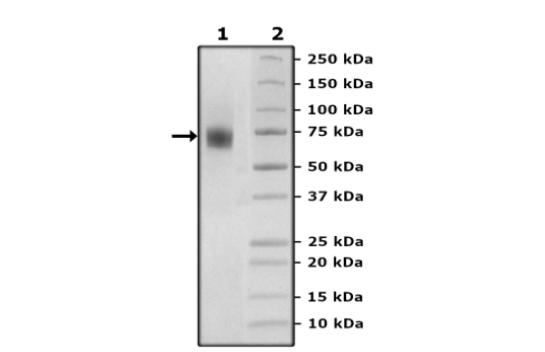FGFR3, Avi-Tag, His-Tag, Biotin-Labeled, HiP™ Recombinant
Recombinant human FGFR3 (fibroblast growth factor receptor 3, also known as CD333), encompassing amino acids 23-375 corresponding to the extracellular domain of the receptor. This construct contains a C-terminal Avi-Tag™ followed by a His-Tag (6xHis). This protein was affinity purified. HiP™ indicates a high purity protein (≥90% pure) and less than 10% aggregation as measured by gel filtration.
≥90%
Aqueous buffer solution.
8 mM phosphate, pH 7.4, 110 mM NaCl, 2.2 mM KCl, and 20% glycerol
This protein is enzymatically biotinylated using Avi-Tag™ technology. Biotinylation was confirmed to be ≥90%.
For more information on enzymatic biotinylation, please see our Tech Note.
FGFR3, also known as fibroblast growth factor receptor 3 or CD333, is a transmembrane tyrosine kinase receptor which belongs to the fibroblast growth factor receptor family involved in osteogenesis and bone maintenance. It has a restricted pattern of expression and is found in the brain, kidneys, cartilage and intestine. Mutations in FGFR3 can result in achondroplasia, hypochondroplasia, Muenke syndrome, glioblastoma and urothelial carcinoma. Inhibitors of FGFR3 show promise for cancer therapy, with pemigatinib approved in 2020 for the treatment of metastatic cholangiocarcinoma.




